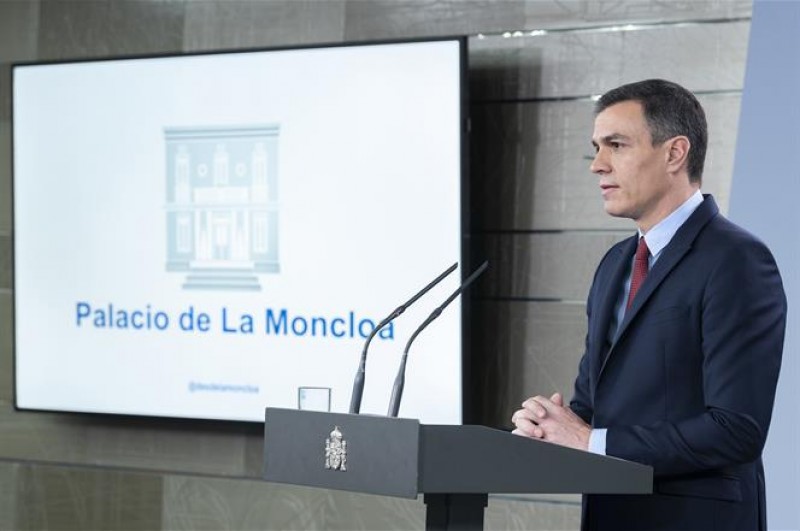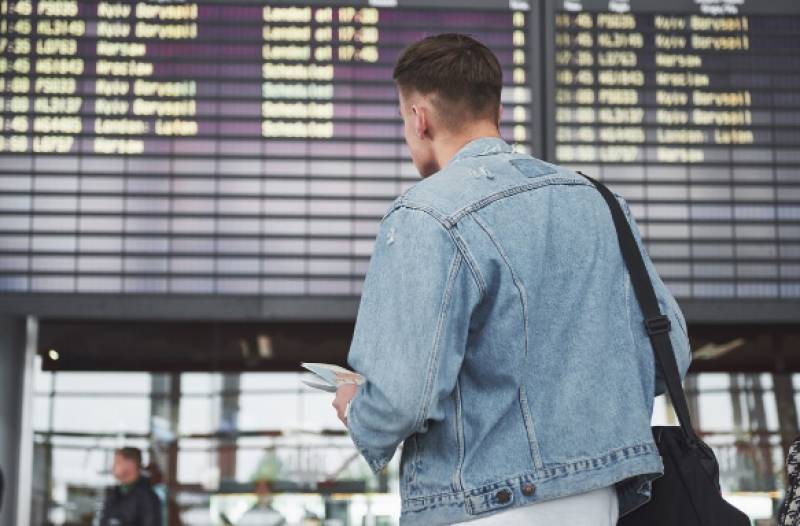Date Published: 14/03/2020
ARCHIVED - Spanish government orders total lockdown of Spain as State of Emergency is ratified
ARCHIVED ARTICLE From 08:00 on Monday morning movement will be restricted across Spain and all but necessary businesses closed
From 08:00 on Monday morning the Spanish government has ordered a total lockdown of Spain to restrict the spread of coronavirus.
The restriction will last for 15 days and will apply to the whole of Spanish territories
The decree prohibits residents of Spain from leaving their homes other than to buy medication, food, to work, look after dependents or go to the bank.
The decree specifies that the public should remain inside their homes other than for eight specific activities:
Acquisition of food
Purchase of pharmaceuticals and basic necessities
Medical appointments or urgent visit to medical centre
Going to work in a job considered to be necessary
Returning to their habitual place of residence
Assistance and care of the elderly, minors, dependents, people with disabilities or especially vulnerable people
Going to the bank
By reason of force majeure or situation of need or "any other activity of an analogous nature which can be duly justified".
All of the above mobility instructions will be enforced from Monday morning enabling those who are away from their habitual residence to return home before the order is enforced.
All other restrictions and conditions announced by the government yesterday in the declaration of State of emergency will come into force upon publication of the Boletín Oficial del Estado (BOE) which will be published later on Saturday.
The government will also take command of the Spanish Armed Forces, who will follow the direct instructions of the Spanish government in enforcing the movement restrictions and ensuring the movement and control of foodstocks and primary materials.
Attendance at masses, weddings and funerals will be permitted, although numbers of attendees must be restricted to “at least one metre” between the individuals attending.
All businesses other than those considered to be necessary will close.
The Prime Minister warns that there will be as many as 10,000 confirmed cases in Spain within "a few days", and that the time has come for an even more drastic response to the situation than had already been confirmed.
Initially the state of emergency will have a duration of 15 days, during which time the government will have the power to:
- Limit the circulation and location of people and vehicles in certain place and times
- Temporarily commandeer and confiscate possessions and enlist people for specific tasks
- Occupy industrial premises, factories, workshops and any other kind of premises
- Limit or ration the use and purchase of important goods and products
- Take whatever steps are necessary in order to guarantee food supplies and the correct functioning of production facilities.
Until Friday Sr Sánchez’s government had favoured a more gradual approach in its response to the coronavirus crisis, but with the number of cases spiralling out of control in some areas it has been decided that the financial and economic sacrifices being made are necessary. In announcing the latest decision, the Prime Minister stressed that it has been made after taking into consideration the recommendations of medical experts and the relevant health authorities.
Only once before since the restoration of democracy after the death of General Franco in 1975 has the Spanish government declared a “state of alarm” (or a national emergency) - that was during the air traffic controllers’ strike in 2010, when the military were empowered to take over duties at airports throughout the country – and the decision was made after the number of coronavirus cases in the region of Madrid alone passed 2,000.
At lunchtime on Saturday Spain officially reported nearly 6,000 cases, although the actual figure is believed to be much higher.
The announcement has already provoked travel chaos, with airlines turning back planes en-route to Spain and large queues forming on major thoroughfares as travellers returned home.
By Friday evening Spain had approximately 5,000 cases, within a week this could be 15,000
On Friday the Murcian regional government took the exceptional measures of announcing the containment of the coastal municipalities of the Costa Cálida, of Águilas, San Pedro del Pinatar, San Javier, Los Alcázares, Cartagena, La Unión and Mazarrón for 14 days. All shops and businesses will be forced to close, the only shops permitted to remain open being food stores, petrol stations, pharmacies and supermarkets.
By Saturday morning, the regional government had announced the same closure restrictions would apply to the whole of the Region of Murcia.
Residents are requested to leave their homes only to buy food and medical supplies and are asked to remain indoors otherwise as the regional government and municipal councils involved take wide-ranging measures to limit the spread of coronavirus.
Yesterday the national government of Spain declared a state of emergency which will be ratified in a special meeting of the Spanish cabinet on Saturday morning and at the moment much more stringent measures could be enforced should the government feel the necessity to do so.
The aim is to try and lockdown the spread of coronavirus, and all of us are being asked to play our part in this process by observing the request that we self- isolate and remain in our homes for the next 14 days.
In some areas this is being enforced; here in the coastal municipalities of the Costa Cálida we are enforcedly confined, and although the roadblocks are only up in areas such as La Manga del Mar Menor to prevent visitors from the cities bringing further cases to our region, other areas are still open for free movement.
At the moment the race is on to stop the spread of the virus, although the health services admit that the horse has not only bolted from the stable already but is off and running across the open plains.
The challenge Spain now faces is to reduce the spread of the virus, and hopes are high that the lockdowns and closures may help us to stem the spread of Covid-19.
At the moment, the progression of the virus has been very similar to that of Italy, and experts estimate that we are now around one week behind Italy in the evolution of the virus, BUT, should residents of the country observe the request for self- isolation and the government enforce lockdown measures, we have a chance to reduce the spread of the virus. In effect, we have a one week advantage over the Italian government.
The first cases in Spain, were logically imported, and were in the islands of Mallorca and la Gomera, originating with foreign travellers and rooted in contact with China, but the virus only began to take hold in Spain when travellers returning from Italy brought the virus with them, even though at that point Italy had no idea that it even had a problem and had no cases in its own country.
For around a week Spain maintained around a hundred cases, and at that point there was considerable scepticism about the reach and voracity of the virus, social networks around the world full of people proclaiming that those who warned against allowing this virus to proliferate were nothing but scaremongers and maintaining that the worst thing that could happen was that a few of us would exhibit cold-like symptoms.
At that point many of us were already infected, the virus spreading rapidly as the key secret weapon of Covid-19 is its ability to infect without its victims showing symptoms for 7-14 days, they themselves duplicating the contagion without having the faintest idea that they were doing so.
On the 9th March alarm bells started to ring, when suddenly 615 new cases were declared here in Spain in a single day, the majority of them in Madrid.
Although some attempt at control followed, localised closures were enforced and the number of attendees at events limited, the stable door was open and the horse was eyeing up the empty stable yard.
Since then, the cases have continued to multiply, students returning from the closed Universities of Italy, teachers returning from the closed schools of Italy, workers returning from the businesses of Italy, returning to their local communities and spreading the virus out across Spain.
With hindsight we could query why they were not forcibly contained, with hindsight we could ask why flights from Italy weren´t shut down sooner, why cruise ships weren´t prevented from docking sooner (this week there has been a huge fuss about an Italian cruise ship due to dock in Cartagena; what about the one that came in the week before full of Italian passengers who wiped out the facemasks available in Cartagena shops, who knows what they may have left behind….) but fortunately we know what has happened in Italy and the Spanish government has a window of opportunity to slow it down NOW.
This week the numbers have continued to rise, the huge leap in cases on Friday by 1,281 in a single day sending out a sufficiently loud alarm bells for the Spanish and regional governments to stop worrying about the effects on the economy and start acting decisively to stem the flow of the virus.
The peak on Friday brought Spain to exactly the same point as Italy seven days ago and the WHO has admitted that Europe is now the epicentre of the virus.
It’s impossible to know what will happen now, as nobody knows how many of us have caught the virus during its “invisible phase” but if we calculate the possibilities based on the same model followed by Italy, taking into account that isolation measures were only taken yesterday in most places, it is realistic to say that the 5,000 cases we had last night could realistically be 15,000 cases within a week.
The death rate here is 2.8%, but the death rate in Italy is 7%, so we could be looking at a number of deaths anywhere between 500 and 1,000 next week.
The pressure on our health service is unthinkable and nobody in the service is under any illusion that the country could handle the volume of cases that could conceivably result from the infections already out there.
This is why the government is declaring a state of emergency, as this gives it the power to requisition private hospitals and their facilities, requisition sports centres and public buildings and open up field hospitals, this is why the army has suspended exercises and is readying itself to go wherever the government sends it to contain any public disorder which may follow and enforce what must be done to beat the virus.
Nobody knows how many cases will follow, but experts are most concerned about the volume of potentially serious cases which require hospitalisation and the facilities currently available to cope with this.
The worst outbreak Spain has at the moment is in Madrid, and in their case 30% of the cases are currently classified as serious and require hospitalisation, and 10% are classed as critical.
This is a lot higher than the rates recorded in China, almost double in fact, but Spain has a high population of elderly people, those most at risk from the virus, so should these figures represent the potential situation by next weekend, then we could have 4,000 people in hospital within seven days, a strain the national health service, although excellent, would struggle to cope with.
So this is why it is essential that we all follow the recommendations to stay indoors, avoid any social contact and play our part in helping to stem the flow of the virus throughout Spain and within our own local communities.
That horse is happily galloping through our midst right now, so let’s stand out of its way, stop giving it food and let it career off up the road and away from our communities.
Please follow Murcia Today on Facebook to keep up to date with all the latest updates locally for the Region of Murcia and the main information for the rest of Spain:
https://www.facebook.com/MurciaToday/. Please note, Facebook is limiting the number of posts we are able to make in local groups, and the sheer volume of incoming information is overwhelming, so all updates and cancellations of events etc in the Murcia region will be posted on this main page and may not be shared into many local groups.
PLEASE help to support the flow and sharing of information by following this page and sharing the information into groups to which you have access.
What to do if you are in the Region of Murcia and believe you may have contracted the virus
The regional government has set up a special helpline to supply information to members of the public (900 121212), and also urges people to call the 112 emergency services line if they suspect that they may have contracted the virus rather than going straight to hospital or to a medical centre. Medical staff will be sent to your home to test for the virus.
The Region’s public hospitals have limited the number of visitors to just one per patient.
Sensible precautions
The advice being issued to members of the public by medical authorities all over the world coincides on the following points:
- Wash hands frequently with either soap and water or a sanitiser gel
- Catch coughs and sneezes with disposable tissues – and throw the tissues away immediately after use before immediately washing your hands!
- If you don’t have a tissue, use your sleeve – and wash the item of clothing used at the next opportunity
- AVOID touching your eyes, nose and mouth with unwashed hands
- AVOID close contact with people who are unwell
- Don´t panic!
article_detail

|


 Spanish News Today
Spanish News Today
 Alicante Today
Alicante Today
 Andalucia Today
Andalucia Today

























